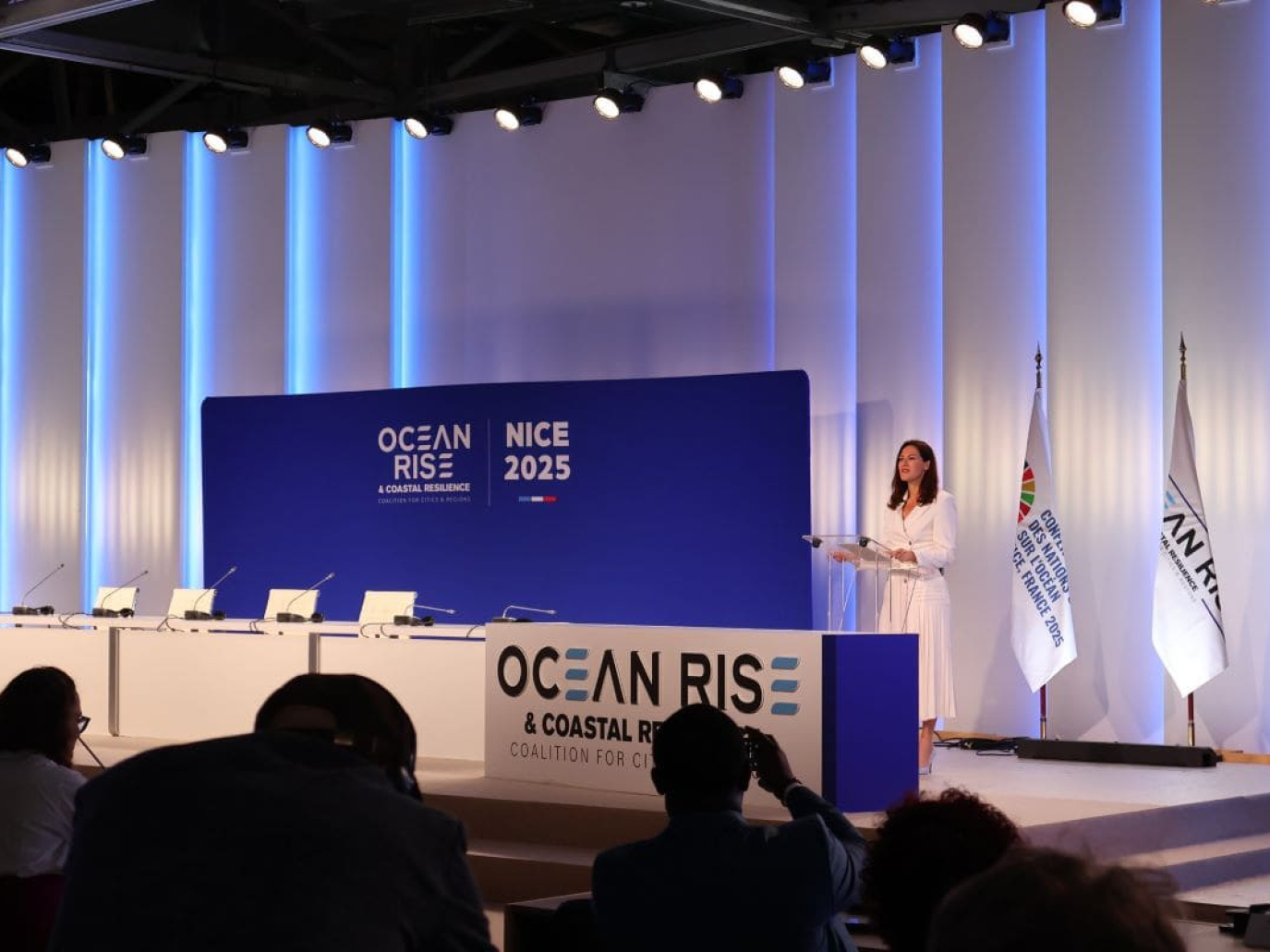This article is also available in Italian / Questo articolo è disponibile anche in italiano
From Nice - The third United Nations Ocean Conference (UNOC3) begins today June 9 and will run until Friday, June 13 in Nice, France. Co-organized by the governments of France and Costa Rica, the main theme of UNOC3 is “Accelerating action and mobilising all actors to conserve and sustainably use the ocean”.
This is not a Conference of the Parties (COP) nor a formal negotiating forum, but rather a gathering of delegates of heads of state and government, NGOs, scientists, funders and other economic actors. Its goal is to adopt a final political declaration, the Nice Ocean Action Plan, calling for accelerated efforts to conserve and sustainably manage the ocean. In other words, strengthening the implementation of Sustainable Development Goal (SDG) 14 “Life below the surface”.
Serious delays on all SDG 14 targets
SDG 14 includes several 2030 targets aimed at combat marine pollution, conserve coastal and marine ecosystems, reduce ocean acidification, end overfishing of natural fish populations, and increase scientific knowledge. However, as detailed in the UN Economic and Social Council (ECOSOC) report Progress towards the Sustainable Development Goals released last April, there is a significant lag in the action needed to achieve each of these targets.
“Science is not the limiting factor,” Joachim Claudet, researcher in socio-ecological systems sustainability at the CNRS and ocean advisor at the CNRS, told Renewable Matter. “Science has influenced many of the actions that States have agreed to implement at the COPs on biodiversity and climate. The lack of positive results [in advancing SDG14] is attributable to poor implementation of these commitments. What is now needed is an independent evaluation system to hold countries accountable.”
Observers are closely watching to see what commitments will be made to accelerate action on certain issues, in particular: governance of human activities in deep-sea ecosystems; accelerating the ratification of the High Seas Treaty (BBNJ Agreement on the Conservation and Sustainable Use of Marine Biological Diversity of Areas Beyond National Jurisdiction); promoting sustainable fisheries management to preserve wild fish stocks; ensuring effective management of Marine Protected Areas (MPAs) under the Kunming-Montréal Global Biodiversity Framework; decarbonizing international shipping under the IMO; and advancing intergovernmental discussions towards the final round of negotiations for a Global Plastics Treaty, scheduled for August in Geneva, Switzerland.
Another critical issue to be addressed at UNOC3 is finance, since SDG 14 remains one of the least funded Sustainable Development Goals.
The role of France: a contrasting picture
In recent months, French President Emmanuel Macron has repeatedly called for UNOC3 to coincide with the 60th ratification of the High Seas Treaty (BBNJ Agreement), a necessary condition for the Treaty to enter into force. Moreover, French Environment Minister Agnès Pannier-Runacher announced that during UNOC3 “France will support an ambitious global treaty on plastics” by launching the “Nice Wake-Up Call” to end plastic pollution, at a press conference this afternoon.
However, as observed by Julien Rochette of the French think tank IDDRI, “France’s maritime and coastal policy is not always exemplary several voices are rightly criticizing the lack of ambition of its network of MPAs, marine pollution caused by land-based activities and excessive harmful subsidies that contribute to the deterioration of the health of the oceans”.
“On the international stage, France is actively promoting the ratification of the High Seas Treaty and supporting a moratorium on deep-sea mining - especially after the executive order signed by Trump last April to expand deep-sea mining in national and international waters, a practice outside of international law,” François Chartier, head of the oceans campaign at Greenpeace France told Renewable Matter. “Governmental mobilization is crucial at UNOC3 so that governments support a moratorium on seabed mining, strengthening multilateralism, at the International Seabed Authority (ISA), held in July in Kingston, Jamaica.”
If this is the “positive side” of France’s action, there is also a “negative side”: the situation of MPAs: “In France we have MPAs that do not actually offer protection [to natural populations and marine ecosystems]. They are unprotected marine protected areas, mainly because bottom trawling is allowed within them. We need to go much further,” added Chartier.The BLOOM association, which has been campaigning against industrial fishing and trawling at French and European level for over 20 years, also shares a very critical stance.
“Emmanuel Macron and the French fishing industry are acting hypocritically. French fishing is extremely destructive and Marine Protected Areas are not protected. It would take a miracle - or an unexpected change of course by the President - to save the third UN Ocean Conference from failure,” Frédéric Le Manach, scientific director of BLOOM, told Renewable Matter.
MPAs designation is a legal obligation under international law
Under the Kunming-Montréal Global Biodiversity Framework, countries agreed to protect 30% of marine biodiversity by 2030. However, everyone is behind schedule. In Europe, “only 2.04% of the seas are currently covered by MPAs with management plans,” according to a WWF report published on June 3.
“The obligation to protect and preserve the marine environment is legally binding under the United Nations Convention on the Law of the Sea (UNCLOS) […] and a customary law. At such, it universally binds all States, including those that have not ratified UNCLOS [such as the United States, Ed],” Anna von Rebay, litigation lawyer, CEO and founder of Ocean Vision Legal - an international law firm entirely specialized in ocean protection - explained to Renewable Matter.
“This obligation requires States to adopt active measures to protect the marine environment from future harm and to maintain or improve current conditions […]. The content and scope of these obligations must be guided by the best available scientific evidence”, adds von Rebay. “Where such scientific evidence clearly shows that MPA designation is necessary to meet environmental protection standards, then designating MPAs becomes a legal obligation, not discretionary policy choice.”
Principle of Protection and Ocean Ministries
Launched in November 2023 by the Varda Group with the support of six partner organizations in the lead-up to UNOC3, the Let's Be Nice to the Ocean movement brought together 110 civil society organizations in support of the Protection Principle. Developed as an evolution of the Precautionary Principle, the Protection Principle states that “by definition, all areas which would not be designated as exploitable would be protected.”
“As ocean degradation becomes increasingly evident in the coming years, applying the Protection Principle - making Ocean protection the norm rather than the exception - will become more and more obvious. One of the proposals is that governments create Ministries of the Ocean – not just fisheries ministries - with holistic visions and responsibility to preserve and restore a thriving ocean”, Remi Parmentier, director of the Varda Group and coordinator of Let’s be Nice to the Ocean, told Renewable Matter. “I come from a time when Environment Ministries were in their infancy or they did not exist altogether, fifty and even less years ago. At the time, there was strong resistance to their creation from other ministries that felt threatened. The same is happening now with how we manage and look at the ocean. It takes time for public administrations to undergo a metamorphosis, but it is our role convey the sense of urgency.”
To move from proposals to action, the “Task Force on the Protection Principle” will be officially launched this evening. This independent initiative will chart concrete pathways to implement the Protection Principle by shifting the burden of proof so that ocean protection takes precedence over exploitation. “The idea is that a multidisciplinary group will answer in 2026 to key questions on the scope and operationalization of the Protection Principle and provide these answers in 2027, one year before UNOC4,” added Parmentier.
Sustainably managing human activities to continue enjoying the benefits provided by the ocean
The ocean contains 99% of the water on Earth and constitutes 95% of the biosphere. It has absorbed about 90% of the excess heat and 25% of the carbon dioxide released into the atmosphere by human activities. The ocean provides many essential benefits to human communities, and there is consensus in the scientific community that we must begin to sustainably manage human activities in marine ecosystems if we want to continue enjoying these benefits.Under the guidance of the UNOC3 Chairs, H.E. Gina Guillen (Costa Rica) and H.E. Olivier Poivre d'Arvor (France), CNRS and IFREMER organized the One Ocean Science Congress (OOSC), held in Nice from 3 to 6 June.
As the first scientific congress ever to precede a UN conference, the OOSC brought together over 2,200 participants from over 110 countries and concluded with the publication of the Science for Ocean Action Manifesto, which was sent to UNOC3 government delegates.
Some of the key points of the manifesto: act immediately where the science is clear; advance knowledge before making irreversible decisions; turn knowledge into action, and action into justice”. The indications of science are clear. The support of civil society is strong. Will political decision-makers be able to find an agreement for a “Nice Ocean Action Plan” that is up to the task?
Cover: Ocean Rise & Coastal Resilience Summit Coalition of Cities and Regions, a side event, 7 June 2025 © UN-DESA



